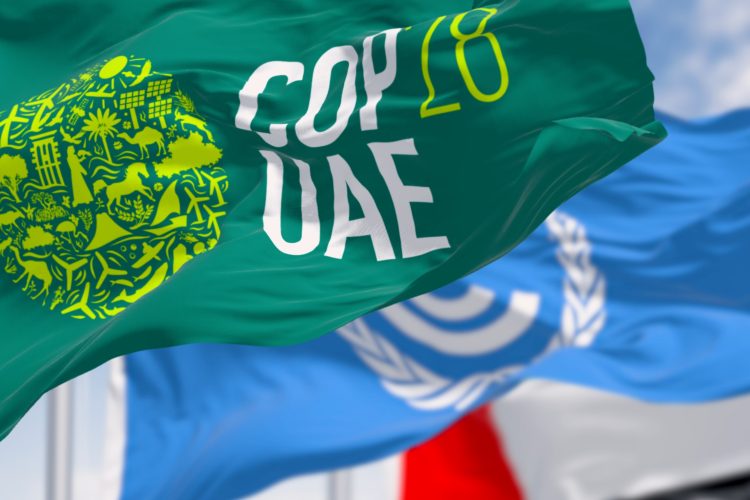Were food systems just a side dish at COP28?
- Like
- Digg
- Del
- Tumblr
- VKontakte
- Buffer
- Love This
- Odnoklassniki
- Meneame
- Blogger
- Amazon
- Yahoo Mail
- Gmail
- AOL
- Newsvine
- HackerNews
- Evernote
- MySpace
- Mail.ru
- Viadeo
- Line
- Comments
- Yummly
- SMS
- Viber
- Telegram
- Subscribe
- Skype
- Facebook Messenger
- Kakao
- LiveJournal
- Yammer
- Edgar
- Fintel
- Mix
- Instapaper
- Copy Link
Posted: 9 January 2024 | Dr Lucy Wallace | No comments yet
Dr Lucy Wallace reflects on how the COP28 conference resulted in a landmark deal focusing on climate action but may have fallen short when it comes to transforming food systems.


By Dr Lucy Wallace, Chief of Staff, EIT Food
COP28 concluded in December, with two weeks of intense negotiations in Dubai leading to a landmark deal between nearly 200 countries.
While there is much more ambition, collaboration and finance needed, we saw real progress during this COP. For starters, $700m has now been pledged for the loss and damage fund agreed at COP27. And while it may seem unbelievable that it’s taken nearly 30 COPs to get here, we do finally have consensus that all nations must transition away from fossil fuels.
But what does this mean for the food systems community?
Despite food systems being responsible for one third of human-caused greenhouse gas emissions, previous COPs have had very little time for food and agriculture. It was only at COP23 that the Koronivia Joint Work on Agriculture was established – the only formal process through which issues surrounding climate and food production are included in the United Nations Framework Convention on Climate Change (UNFCCC).
A decision at COP27 to renew the KJWA (which originally had a four-year lifespan) was welcomed, but the process continues to be a frustrating one, focusing narrowly on agricultural production whilst ignoring other critical components of food systems including how we process, transport, consume and discard food.
The good news is that the wider food community has rallied together like never before to get food systems onto the agenda. COP27 in Egypt saw the first ever Food Systems Pavilion – a dedicated space within the conference which brought together representatives across the food sector and beyond, sparked debate around food and climate issues, and helped to build a strong, collaborative community around the food and climate nexus.
However, the final COP27 agreement was disappointing, only referencing food production and lacking the ambition needed to address food systems as a whole. Building on the momentum from the previous year, over 80 organisations came together ahead of COP28 to sign an open letter which urged Parties to the UNFCCC to integrate a whole food systems approach throughout climate negotiations.
So, did COP28 deliver for food systems?
Just days into the conference, countries were rallying behind a declaration on food systems and climate. Not only is the Emirates Declaration on Sustainable Agriculture, Resilient Food Systems and Climate Action the first pledge of its kind at a leaders’ level, it emphasises the role of whole food systems in either driving or mitigating climate change.
Signed by over 150 countries, the Declaration covers issues including food security, production, nutrition, nature restoration, water management, and the need to support farmers and other food producers. What’s more, it commits to strengthening these efforts through a diverse set of approaches including policy engagement, scaling up and enhancing access to finance, and accelerating innovation. Signatories are expected to show progress on these commitments when they reconvene at COP29.
The final COP agreement – the culmination of the first ever “global stocktake” under the Paris Agreement – stopped short of showing real ambition for food. While a reference to ‘resilient food systems’ made it into the adaptation section of the text for the first time, food and agriculture were entirely missing from the section on mitigation.
To repeat: Food systems are responsible for one third of emissions. It is essential that national climate action plans (NDCs) include targets which aim to reduce these emissions, and this gap in the final text is a real concern.
Thankfully, people power came into true force outside of the negotiating rooms. The Food Systems Pavilion returned to COP to host 11 days of dynamic panel discussions, roundtables and press briefings with experts across the food system, as well as jointly hosting the Action on Food Hub with the Food4Climate Pavilion. These collaborative spaces brought together policy experts, investors, researchers, food producers and other civil society representatives to put food centre stage throughout the conference.
By uniting so many divergent perspectives, we were able to strengthen our community and commit to accelerating the transition to healthy, resilient and equitable food systems together. This is particularly exciting from an innovation perspective, with so many actors across the food system having the opportunity to support agrifood tech innovations which aim to solve climate challenges.
On Food, Agriculture and Water Day, we held a roundtable with the Global Cellular Agriculture Alliance, The Good Food Institute, and several entrepreneurs at the cutting edge of protein diversification to discuss the challenges and opportunities around accelerating and scaling innovation, and to emphasise the importance of multi-stakeholder collaboration in successfully decarbonising the food industry.
I followed up with Maarten Bosch of cultured meat startup Mosa Meat to ask him how climate negotiations could impact food systems innovation, and what he thinks of the outcomes of COP28:
“Unlike fossil fuels, food systems have the potential to be shifted from being a primary cause toward a powerful solution to the climate crisis. However, policymakers must embrace innovation from farm to fork to enable this transformation.
“With the FAO expecting meat consumption to double in the next 30 years, we strongly encourage negotiators at COP29 to get serious about protein diversification as a climate adaptation and mitigation strategy, including more agroecology, more pulses and legumes, and meat and dairy made via cellular agriculture. All of these complementary approaches together give us our best shot at avoiding the worst-case climate change scenarios.”
What happens next?
Food systems were well and truly on the table at COP28, but the final agreement fell short of a holistic commitment to transform food systems.
The Emirates Declaration sent a powerful signal of international ambition to unite food systems and climate action. It is essential that we now hold leaders accountable and play our roles – whether that be through innovation, finance, research, education or building partnerships – to support them in implementing this pledge.
By turning trade-offs into opportunities, we can achieve our shared goal to accelerate the transition to healthy, resilient and equitable food systems. The most inspiring thing about COP28 was witnessing how much we can achieve through collaboration and uniting diverse perspectives – and we have a huge opportunity to build on this momentum in 2024.
With enough ambition, we can make COP29 the ‘Food Systems COP’.
About the author


Related topics
Cultured Meat, Food Security, Food Waste, Regulation & Legislation, Supply chain, Trade & Economy, World Food









